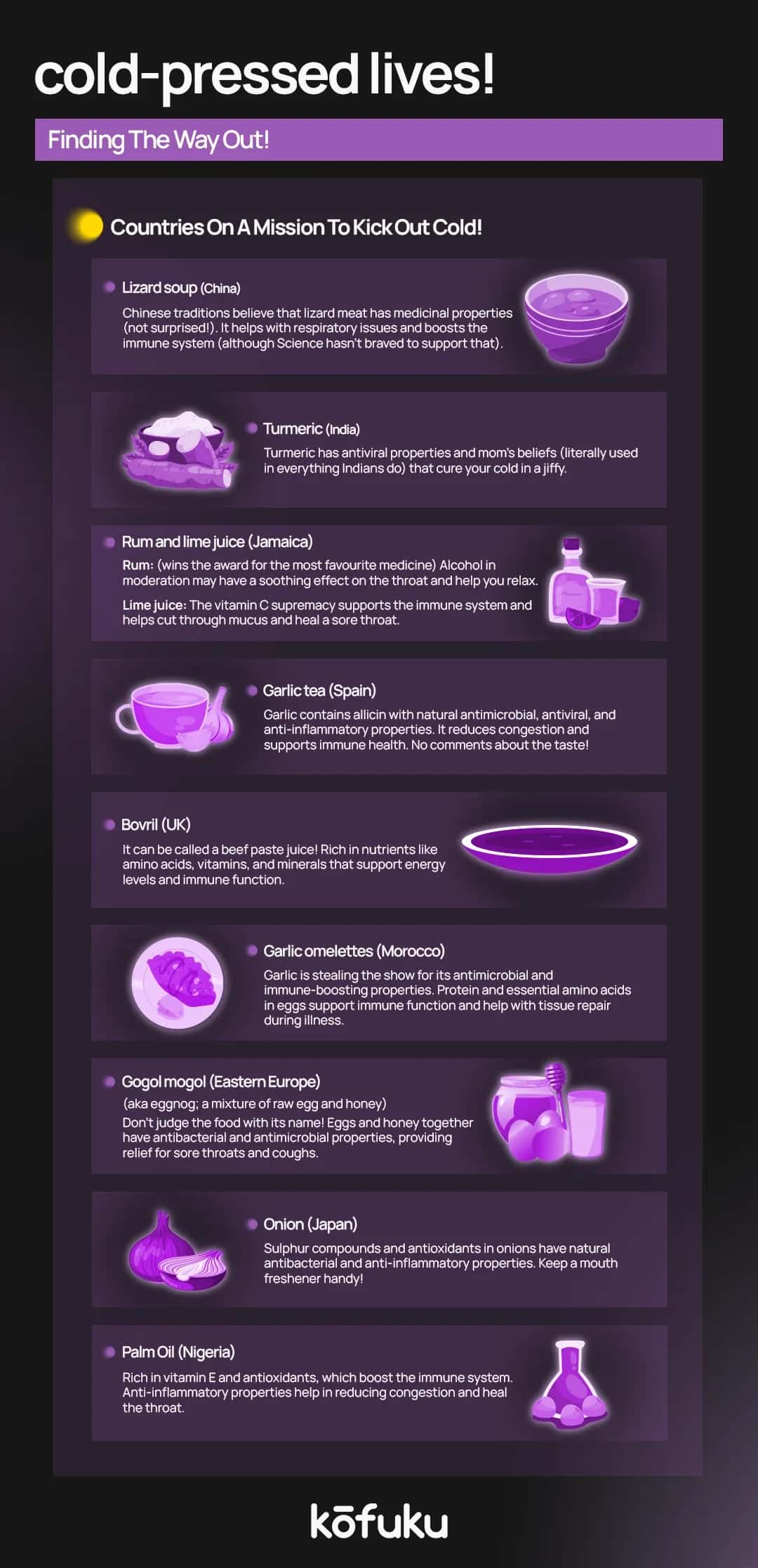A Guide to Get Rid of a Cold Faster

Introduction
Alright, before we dive in, let's get one thing straight- there's no magic cure for the common cold—thanks to your friendly neighbourhood viruses. But that doesn’t mean you have to suffer through it.
You can try plenty of remedies to ease your symptoms and speed up your recovery, so you don’t have to feel miserable while waiting for your body to kick the cold to the curb.
How common is the common cold?
The common cold is incredibly, well, common. On average, adults catch two to three bouts of cold a year, and children tend to catch even more. While you’re most likely to get a cold during the colder months (winter and spring), it's totally possible to catch one at any time of the year.
One reason the common cold spreads so easily is that it's incredibly contagious. It spreads through tiny droplets when someone who’s infected coughs, sneezes, or talks. It can also spread when you touch a surface or object that has the virus on it and then touch your face, like your eyes, nose, or mouth.
So, what can you do when the inevitable happens? Well, self-care is key. Taking care of yourself is especially important when you have the common cold.
Let’s get into it.
Quick Fixes for a Cold
1. Drink Plenty of Fluids
When you’ve got a cold, keeping hydrated is one of the best things you can do for yourself. Sipping on plenty of fluids helps loosen up that chest congestion and clear out your stuffy nose, so you can breathe easier.
Just be sure to avoid drinks like coffee or alcohol—they can actually dehydrate you, which isn’t helpful when your body needs all the hydration it can get.
2. Steam Inhalation
This remedy has stood the test of time. Inhaling steam from a bowl of hot water can do wonders for relieving nasal congestion and helping you breathe easier.
If you're not in the mood to sit over a bowl, a hot shower works just as well! The steam from the shower will help loosen up all that stuffiness and leave you feeling a lot more comfortable.
3. What’s The Tea?
Here’s the tea—nothing beats a hot cup of ginger, lemon, and honey when you’re battling a cold. It might even be more effective than some over-the-counter meds!
Ginger has natural anti-inflammatory and antiviral properties that can help reduce cold symptoms, while honey works its magic with antibacterial and antimicrobial benefits, soothing that sore throat. And let’s not forget lemons—packed with vitamin C, they give your immune system a nice boost and help ease those cold symptoms.
So, brew yourself a cup, sit back, and sip your way to feeling better.
4. Give It a Rest
If you think you can just wear a mask and power through the day, think again. Even if you plan to work from home, back-to-back meetings and last-minute requests can take a toll on your body.
What you really need is to rest—lie down, don’t strain your eyes or back, and just let yourself relax. If you’ve got someone around, let them take care of you. And if you're on your own, just order in! Your body does its best healing when you give it the time and space to rest.
5. Saltwater Nasal Rinse
A saltwater nasal rinse can be a game-changer when you're dealing with a stuffy nose. By using a saline solution to rinse your nasal passages, you can help clear out mucus and reduce congestion, making it easier to breathe.
If the idea of a full rinse feels like too much, don’t worry—saline drops or nasal sprays can do the trick, too. These help shrink the blood vessels in your nose, opening up the airways and easing that uncomfortable stuffiness.
While it’s super helpful, you don’t want to overdo it with decongestants. It’s best to stick to using them for a couple of days only.
6. Chicken Soup For The Soul
Chicken soup has been a go-to remedy for ages when you're feeling under the weather. If you’re battling a cold and your throat feels too sore to swallow much, this is exactly what you need.
Not only is chicken soup packed with nutrients like protein, vitamins, and minerals that help support your immune system, but it also provides much-needed hydration. The warmth from the soup can soothe your sore throat, clear your stuffy nose, and help ease congestion.
Plus, the amino acids in the chicken, especially cysteine, can actually help thin mucus, making it easier to breathe and feel more comfortable.
It’s not just about the physical benefits, though. Chicken soup offers that cosy, comforting feeling when you need it most, making you feel a little better, both physically and emotionally, when you're sick.

7. Humidifiers
Add some cool moisture to the air with a good quality humidifier! Placing one in your bedroom while you sleep can make a big difference—it helps keep the air nice and moist, which is great for easing congestion and soothing those dry, irritated nasal passages.
It’s like creating your own little oasis of comfort while you rest.
8. The Spice Route
In many Indian households, food is more than just nourishment—it’s a remedy, especially when it comes to the common cold. When a stuffy nose and congestion hit, it's time to bring out the spices!
Let’s take a look at a couple of comforting options you can try:
Kadha: This is a popular herbal concoction made with holy basil, peppercorns, and a mix of other spices, all boiled together in water. It’s a go-to hot infusion that can help clear up congestion and soothe your symptoms.
Rasam: Think of this as the Indian version of chicken soup. It’s a hot, peppery, tangy broth made with spices like cumin seeds, mustard seeds, turmeric, garlic cloves, curry leaves, tomatoes, and tamarind. It’s incredibly soothing and packed with flavor to help you feel better fast.
Haldi Doodh: This turmeric-infused milk is a true comfort in a glass. The anti-inflammatory and antimicrobial properties of turmeric help ease cold symptoms, while the warm milk soothes your throat and gives you that cozy feeling. Add a little honey, and it’s perfect for easing that sore throat. Plus, it’s the ultimate sleep-inducer, which is just what you need to heal.
9. Warm Compress
A warm compress is a simple yet effective way to find some relief when you're feeling congested. Applying it to your sinuses or chest can help ease discomfort and reduce that stuffy feeling.
The heat helps open up your nasal passages and promotes better airflow, making it easier to breathe and feel more comfortable overall.
10. Eat Food That Boosts Immunity
Fuel your body with some immunity-boosting foods! Bananas, bell peppers, blueberries, carrots, cranberries, onions, and even black and green tea are packed with nutrients and compounds that help support your immune system.
These foods can give your body the extra help it needs to fight off infections and feel stronger as you recover.

Conclusion
A lot of times, it’s not about what you do—it’s about what you don’t do. There are a ton of remedies out there, but honestly, none of them will work if you don’t give your body the rest it needs. If you try to power through a cold without taking it easy, all you’re doing is wearing yourself out, making it harder for your body to fight off the virus.
So, take it slow, get some good rest, and let your body do what it does best - heal.
FAQs
Q. What’s the difference between a cold and the flu?
A. The common cold and the flu are both respiratory illnesses caused by viruses. The symptoms are similar, but the flu is more severe and mostly includes fever and body aches, whereas the cold is much milder.
Q. What is the incubation period of the common cold?
A. The common cold has an incubation period of one to three days after exposure. Symptoms like sore throat, sneezing, and runny nose typically begin within this timeframe. People are most contagious early in the illness, even before symptoms fully appear, making the virus easy to spread in close-contact settings.
Q. Who is more susceptible to contracting the common cold?
A. Everyone is susceptible to catching a cold, but children, older people, and people with weakened immunity are more likely to do so.
Q. How long does the common cold typically last?
A. A cold typically lasts seven to ten days. However, in some cases, one may still feel the symptoms for up to two weeks.
Q. Is there a risk of a cold progressing to pneumonia?
A. While the common cold can sometimes cause secondary bacterial infections like pneumonia, it is still pretty rare. Most colds resolve on their own without any complications.
Q. Can a cold lead to a temporary loss of taste or smell?
A. Yes, a cold can briefly affect taste and smell due to nasal congestion and inflammation of the nasal passages. This usually resolves as the cold clears up.


10 Health Benefits of Apple Cider Vinegar You Should Know

Benefits of CCF Tea That You Should Know About

10 Weirdest Myths About Weight Training

10 Skin Diseases You Should Know About

7 Essential Facts You Should Know About Lung Cancer


